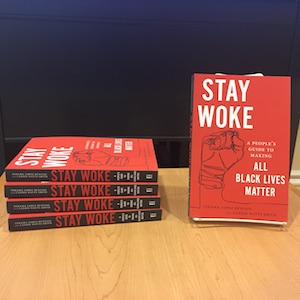By Nora Malatinszky and Marsha Mayhak
In this age of technology and fast news, even the most seemingly direct statements can be interpreted and responded to in an endless variety of ways. Such, of course, is the case with the well-known (and oft-contested) rally cry, “Black Lives Matter.” What, at their core, do these words really suggest? Whose behaviors have necessitated the use of these words, and more importantly, who do they call to action? Does modern society reflect the assertion that Black lives matter, or is there still work to be done?
This is the foundation for Stay Woke: A People’s Guide to Making All Black Lives Matter, a book recently co-authored by Tehama Lopez Bunyasi, an assistant professor at the School for Conflict Analysis and Resolution, and Candis Watts Smith, an associate professor of political science and African American studies at Penn State University. The scholars use their combined expertise and experiences to lay out a framework for approaching dialogue on racial issues, recognizing one’s own personal failings, and taking productive steps towards a more racially conscious society—all in terms accessible to the average person.
Lopez Bunyasi has devoted much of her academic career to the study of racial inequality in America, with a particular focus on perceptions of whiteness.
“The fact that I study race and racism at all has a lot to do with both how my identity is treated in different contexts and also how people talk about race or don’t talk about race in different contexts,” she said. She emphasized the importance of having open conversations about race, even—and perhaps especially—when it might be uncomfortable.
“The thing that Candis and I want to get across [is that] we wrote this book for people of various racial groups. This is not just a book for white people. It’s not just a book for Black people. It’s not just a book about Black people,” Lopez Bunyasi said. “The whole reason that BLM is a thing is not because Black people are living in a vacuum; it’s because Black people live around people who have white supremacist and racist and fearful ideologies that impact their lives.”

"Stay Woke" (NYU Press, 2019) by Tehama Lopez Bunyasi and Candis Watts Smith.
The publication of this book by New York University Press places Stay Woke’s message in a unique position to reach a wide variety of audiences. At the authors’ book launch, hosted by the American Political Science Association on September 27, 2019, Smith highlighted that academic presses are often hesitant to publish books that are written for both academic and non-academic readerships. The editors at the NYU Press, however, were excited to support a project that aimed to balance academic integrity with accessibility to information.
“Stay Woke is unconventional in that way— that we don’t necessarily conform to the language, the words, or the place” that many academics are incentivized to capitalize on, said Smith.
What is wokeness, anyway?
The call for people to “stay woke” engages the popular term that came out of the Black Lives Matter movement, encouraging people to stay alert and maintain awareness of racial injustice within their societies.
With the release of their book, Lopez Bunyasi and Smith have unpacked an entire glossary of terms for anti-racism that people can incorporate into their vernacular when tackling these subjects. Having this vocabulary opens doors for people to not only ask themselves and their communities tough questions, but also to begin pondering the possibilities for dismantling the structural violence of our racist society and the cultural violence of our racist ideologies.
Of course, it is not only people of color who are affected by these ideologies.
“Even though the focus here is on anti-Black racism, it wouldn’t make sense outside of the context of talking about white supremacy period, which affects all kinds of people—including white people,” Lopez Bunyasi said.
Informing and providing invitations to intervene in structural violence, the authors poignantly draw in everyday people in America. The friction of racial divides in the United States is a living, breathing conflict. Lopez Bunyasi tells us that, though we each “have different roles to play, [and] we’re differently affected,” we are all in this together.
So, what can we do?
Many people can have difficulty determining where they fit into this effort. Upon recognizing the disparities and power dynamics impacting your own life, there are a variety of ways to add your own voice to the conversation.
Lopez Bunyasi encourages us to consider, and even grapple with, questions that place us outside of our comfort zones. “How is your life, the quality of your life, worsened, weakened, because you live in a system of white supremacy?” she asks.
Partaking in social movements or other sustained efforts to make waves of change are important ways that everyone can contribute. Though there can be a hesitation to get involved in activism due to the perception that all politics are corrupt and every campaign is money-driven, everyone can do something for society that will change peoples’ material lives; everyone can be a part of the conversation. “Everyone has something they can offer,” said Lopez Bunyasi.
To learn more about Stay Woke, please join the School for Conflict Analysis and Resolution’s Diversity, Equity, and Inclusion Committee for a virtual book talk with Lopez Bunyasi on Friday, May 1, 2020, at 2:00 PM (EDT). The discussion will focus in particular on what the S-CAR community can do to address injustices and build a more equitable and inclusive school and network.
Find the guide from Lopez Bunyasi and Smith on how racial inequality shapes our lives—and what we can do about it—on the websites of your favorite local bookstore, the NYU Press, Barnes & Noble, or Amazon.
Stay woke, everyone.
